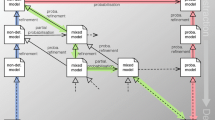Abstract
Accurate gathering of requirements is a major concern during conceptual modelling. Such accurateness can only be achieved through major involvement of users, who should check whether the system's specification conforms with their expectations. This task can be facilitated both by intuitive conceptual constructs and by executable models that allow interaction with the user to explain the behaviour of the system in accordance with its specification. This work proposes the notions of stimuli and business policies as intuitive behavioural constructs, and the use of the event calculus as an appropriate formalism for building executable specifications for behavioural models. The approach is borne out by an early implementation that allows the user to question why and how a given state is reached, where the answer is given in terms of the specifications, i.e. stimuli and policies, being applied.
Chapter PDF
Similar content being viewed by others
Keywords
These keywords were added by machine and not by the authors. This process is experimental and the keywords may be updated as the learning algorithm improves.
References
M. Andersson and J. Bergstrand. Formalizing Use Cases with Message Sequence Charts. PhD thesis, Lund Institute of Technology, 1995.
S. Chakravarthy, V. Krishnaprasad, E. Anwar, and S.-K. Kim. Composite events for active databases: Semantics, contexts and detection. In J. Bocca, M. Jarke, and C. Zaniolo, editors, Proc. 20th Int. Conf. on Very Large Data Bases, pages 606–617. Morgan-Kaufmann, 1994.
S. Cook and J. Daniels. Designing Object Systems: Object-Oriented Modelling with Syntropy. Prentice Hall, 1994.
O. Diaz, J. Iturrioz, and M.G. Piattini. Stability: a criterion for software evolution enhancement. Submitted for publication, 1996.
A.A.A. Fernandes, M.H. Williams, and N.W. Paton. A logic-based integration of active and deductive databases. New Generation Computing, 1996.
S. Gatziu and K.R. Dittrich. Events in an active object-oriented database system. In M. Williams N. Paton, editor, Proc. of the 1st Intl. Workshop On Rules In Database Systems, pages 127–142. Springer-Verlag, Workshops in Computing series, 1993.
B. Henderson-Seller, M. Fung, and Lin Mei Yap. The role of business rules and quality in methodologies. ROAD, Nov–Dec:10–12, 1995.
R. Kowalski. Database updates in the event calculus. Journal of Logic Programming, 12:121–146, 1992.
R. Kowalski and M. Sergot. A logic-based calculus of events. New Generation Computing, 4:67–95, 1986.
P. Loucopoulos. Conceptual modeling, in [11], pages 1–26, 1992.
P. Loucopoulos and R. Zicari (Editors). Conceptual modeling, databases and CASE. Wiley, 1992.
T. Moriarty. Bussiness rule analysis. Database Programming and Design, 6(4):66–69, 1993.
A. Olivé and M.R. Sancho. Validating conceptual specifications through model execution. Journal of Information Systems, 21(2):167–186, 1996.
A. Tsalgatidou and P. Loucopoulos. An object-oriented rule-based approach to the dynamic modeling of information systems. In H.G. Sol and K.M. van Hee, editors, Dynamic Modeling of Information Systems. Elsevier Science Publishers (North Holland), 1991.
Author information
Authors and Affiliations
Editor information
Rights and permissions
Copyright information
© 1997 Springer-Verlag Berlin Heidelberg
About this paper
Cite this paper
Díaz, O., Paton, N.W. (1997). Stimuli and business policies as modelling constructs: Their definition and validation through the event calculus. In: Olivé, A., Pastor, J.A. (eds) Advanced Information Systems Engineering. CAiSE 1997. Lecture Notes in Computer Science, vol 1250. Springer, Berlin, Heidelberg. https://doi.org/10.1007/3-540-63107-0_3
Download citation
DOI: https://doi.org/10.1007/3-540-63107-0_3
Published:
Publisher Name: Springer, Berlin, Heidelberg
Print ISBN: 978-3-540-63107-1
Online ISBN: 978-3-540-69148-8
eBook Packages: Springer Book Archive





